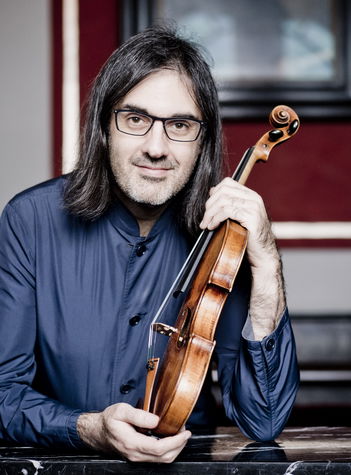1 / 6
Czech Philharmonic, Leonidas Kavakos • Dvořák Prague Festival
Programme
Wolfgang Amadeus Mozart
Violin Concerto No. 3 in G major, K 216
Sergei Prokofiev
Symphony No. 6 in E flat minor, Op. 111
Performers
Leonidas Kavakos violin, conductor
Czech Philharmonic

Customer Service of Czech Philharmonic
Tel.: +420 227 059 227
E-mail: info@czechphilharmonic.cz
Customer service is available on weekdays from 9 a.m. to 6 p.m. Whenever you need to purchase a wheelchair-accessible ticket.
Performers
Leonidas Kavakos violin

Greek violinist Leonidas Kavakos is recognized across the world as an artist of rare quality, combining unparalleled technique with captivating musicality and interpretative originality. He regularly collaborates with leading ensembles and conductors and performs as a soloist in the world’s most prestigious concert halls and festivals.
As a soloist, he works with elite orchestras such as the Vienna and Berlin Philharmonics and the London Symphony Orchestra. In the 2025/26 season, he will appear with the Royal Concertgebouw Orchestra, the New York Philharmonic, Orchestre Philharmonique de Radio France, and the Leipzig Gewandhaus Orchestra. In recent years, he has also firmly established himself as a conductor, appearing with the Czech Philharmonic, the Barcelona Symphony Orchestra, and the Minnesota Orchestra, among others.
In 2022, he founded the ApollΩn Ensemble, a chamber group of elite Greek musicians who are in increasing demand internationally. With this ensemble, he performs at the Verbier, Edinburgh International, and Santander festivals, as well as in London’s Wigmore Hall and the Vienna’s Musikverein. In 2025 he takes over as the Artistic Director of the „Classic Revolution“ Festival at Lotte Concert Hall, Seoul.
He records exclusively for Sony Classical. To mark the Beethoven anniversary, he released Beethoven’s Violin Concerto, which he performed both as soloist and conductor with the Bavarian Radio Symphony Orchestra, and reissued the complete Beethoven sonatas with Enrico Pace, originally recorded in 2007 and awarded the Echo Klassik Instrumentalist of the Year. Together with Emanuel Ax and Yo-Yo Ma, he also released the acclaimed album Beethoven for Three, featuring two Beethoven symphonies arranged for piano trio.
Leonidas Kavakos was born into a musical family in Athens, where he now curates annual masterclasses for violin and chamber music, attracting young artists from all over the world. In 2024, he was appointed professor of violin at the Basel Academy of Music. He performs on the 1734 „Willemotte“ violin by Antonio Stradivari.
Compositions
Wolfgang Amadeus Mozart
Concerto for Violin and Orchestra No. 3 in G Major, KV 216
During his life, Wolfgang Amadeus Mozart composed five violin concertos, the first in 1773, the other ones in 1775. In them he capitalized on the experience from his trips to Italy, the knowledge of French music and the inspiration drawn from Josef Mysliveček, a Czech composer living in Italy. Concerto for Violin and Orchestra No. 3 in G major, KV 216 was heard for the first time at the court of the Salzburg archbishop; it was probably performed by the court violinist Antonio Brunetti. The composition modeled after Vivaldi consists of three movements. Mozart borrowed the theme of the opening energetic Allegro from his opera Il re pastore; he did it not because he would lack inventiveness, but rather because this theme was more suitable for the violin than for singing. The enchanting Adagio with a dance central section played by woodwind instruments is followed by Rondeau, which quotes from at least one French folk tune. Mozart ends the whole concerto with his characteristic unpredictability: instead of an orchestral tutti, the listeners are bid farewell by the woodwind section in the weakened dynamics, evoking a feeling of disappearing music.
Sergei Prokofiev
Symphony No. 6 in E flat minor, Op. 111